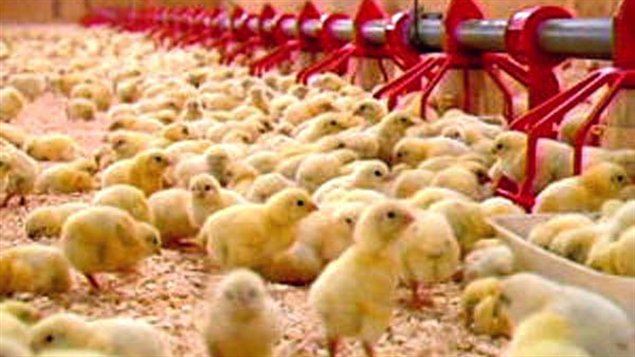It’s a clear case of drug abuse, or at least misuse, and the Chicken Farmers of Canada has taken matters into their own hands.
Chicken farmers-particularly factory operations- across Canada will be ending use of Category-1 antibiotics starting next month. These are a Health Canada class of antibiotics that are considered important in human medicine.
The long-held concern is that indiscriminate use of antibiotics on farms as a preventative measure has been contributing to the increase in drug resistant bacteria or “superbugs” which are becoming increasingly difficult to treat in humans.
Canadian federal and provincial scientists investigating microbial outbreaks at farms, slaughterhouses, and retail sites have clearly documented that such indiscriminate use of antibiotics on farms has contributed to resistant bacteria which then move into the human sphere. In the case of Ceftioflur, an antibiotic injected into hatchery eggs the evidence is clear. Ceftioflur is in a group of “cephalosporins” a category of antibiotics used to treat difficult infections.
The industry introduced ban, effective May 15, will end use of Ceftioflur which is injected into eggs to prevent yolk-sac infection. The drug was never approved at the federal level for such use, but hatcheries were able to circumvent the rules through a loophole called “off-label” use, which is regulated at the provincial level where the rules are different.
Researchers with the Public Health Agency of Canada reported as far back as 2003 that bacterial resistance to Ceftioflur in both chickens and humans was increasing where the practice of preventative injection was occurring during their studies in the provinces of Ontario and Quebec.
When Quebec voluntarily banned Ceftioflur in 2005, researchers at the Canadian Integrated Program for Antimicrobial Resistance, or CIPARS noted the incidence of Ceftioflur resistance in Salmonella Heidelberg decreased dramatically. However, when use began again in 2007, salmonella Heidelberg resistance increased.
The Canadian research is some of the most compelling evidence that antibiotic use in livestock can increase the spread of resistant infections in humans and have been used to support bans on agricultural uses of cephalosporins in Europe, and was held up at hearings in Washington that led to U.S. restrictions on the agricultural use of ceftiofur in 2012.
The federal agency Health Canada responded to the science by requiring Ceftioflur packaging to contain a warning about “off-label” use, but it had no regulatory power at the provincial level.
A scientist, Frank Aaresstrup, working with the World Health Organization on antimicrobial resistance says the Canadian studies wer excellent but expressed surprise that no legislation followed to stop the injections years ago.
The Chicken Farmers of Canada ban is not a government instituted ban, but rather their own mandatory ban. Their on-farm food safety programme which is mandatory in all 10 provinces. More than 98 percent of chicken farmers in Canada are certified on it, and farms are audited annually as part of the programme.
US CENTRE FOR DISEASE CONTROL video on resistant bacteria growth







For reasons beyond our control, and for an undetermined period of time, our comment section is now closed. However, our social networks remain open to your contributions.